外研社英语八年级下同步辅导与练习 Module 2教案
外研版英语八年级下册Module 2《Experiences》教案
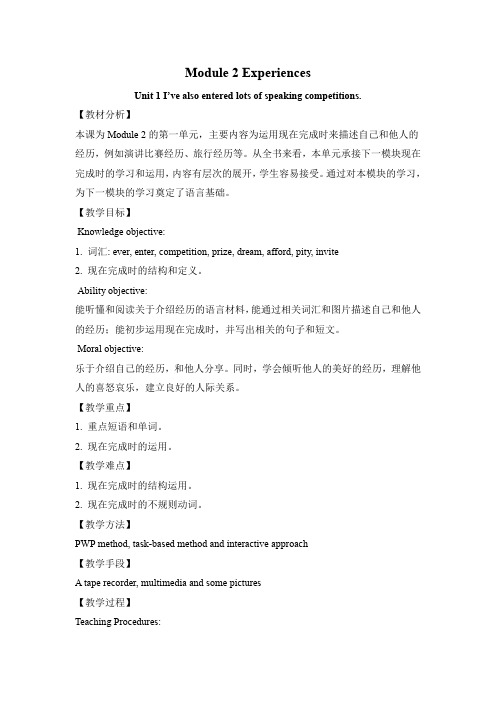
Module 2 ExperiencesUnit 1 I’ve also entered lots of speaking competitions.【教材分析】本课为Module 2的第一单元,主要内容为运用现在完成时来描述自己和他人的经历,例如演讲比赛经历、旅行经历等。
从全书来看,本单元承接下一模块现在完成时的学习和运用,内容有层次的展开,学生容易接受。
通过对本模块的学习,为下一模块的学习奠定了语言基础。
【教学目标】Knowledge objective:1. 词汇: ever, enter, competition, prize, dream, afford, pity, invite2. 现在完成时的结构和定义。
Ability objective:能听懂和阅读关于介绍经历的语言材料,能通过相关词汇和图片描述自己和他人的经历;能初步运用现在完成时,并写出相关的句子和短文。
Moral objective:乐于介绍自己的经历,和他人分享。
同时,学会倾听他人的美好的经历,理解他人的喜怒哀乐,建立良好的人际关系。
【教学重点】1. 重点短语和单词。
2. 现在完成时的运用。
【教学难点】1. 现在完成时的结构运用。
2. 现在完成时的不规则动词。
【教学方法】PWP method, task-based method and interactive approach【教学手段】A tape recorder, multimedia and some pictures【教学过程】Teaching Procedures:Step 1 Lead in1. Ss watch the video and answer “What’s this video about?”2. Ss look the pictures and answer the questions.Step 2 Consolidate new wordsLook and say. The teacher shows the pictures of new words and let the students to say as quickly as possible.Step 3 Listen and number the words as you hear them1.Look at the words first.2.Then listen to the tape and number the words.Step 4 Listen again and choose the correct answer1.Look at the three sentences carefully.2.Listen to the tape again and choose the correct answer.Step 5 ReadingListen and read, then answer the two questions:1. What is Lingling entering?2. Who is going to enter the writing competition?Step 6 Work in pair.1. Work in group. Make a competition to find who can find out the most sentenceswhich are the present perfect tense.2. Read Part 3 and check what Linging and Tony have or have not done.3. Work in pairs. Ask an answer questions about what Linging and Tony have orhave not done.Step 7 Everyday EnglishMaster the main sentences in the passage.Step 8 Language pointsSs should master the main points from the passage in Part 3. If possible, let the students to say at first.1. I am entering a competition.我正参加一个比赛。
外研版八年级下M1U2(2)教学案
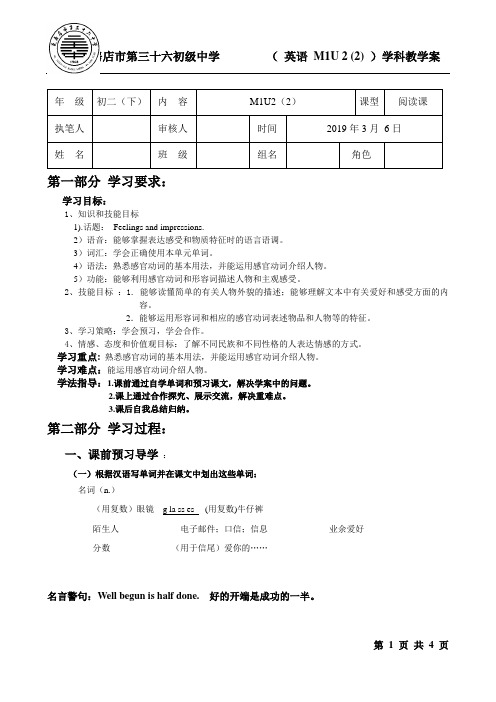
第一部分学习要求:学习目标:1、知识和技能目标1).话题:Feelings and impressions.2)语音:能够掌握表达感受和物质特征时的语言语调。
3)词汇:学会正确使用本单元单词。
4)语法:熟悉感官动词的基本用法,并能运用感官动词介绍人物。
5)功能:能够利用感官动词和形容词描述人物和主观感受。
2、技能目标:1. 能够读懂简单的有关人物外貌的描述;能够理解文本中有关爱好和感受方面的内容。
2.能够运用形容词和相应的感官动词表述物品和人物等的特征。
3、学习策略:学会预习,学会合作。
4、情感、态度和价值观目标:了解不同民族和不同性格的人表达情感的方式。
学习重点:熟悉感官动词的基本用法,并能运用感官动词介绍人物。
学习难点:能运用感官动词介绍人物。
学法指导:1.课前通过自学单词和预习课文,解决学案中的问题。
2.课上通过合作探究、展示交流,解决重难点。
3.课后自我总结归纳。
第二部分学习过程:一、课前预习导学:(一)根据汉语写单词并在课文中划出这些单词:名词(n.)(用复数)眼镜__g la ss es__ (用复数)牛仔裤______________陌生人______________电子邮件;口信;信息______________业余爱好______________分数______________(用于信尾)爱你的……______________名言警句:Well begun is half done. 好的开端是成功的一半。
名言警句:Well begun is half done. 好的开端是成功的一半。
形容词(adj.)情绪不安的;紧张的______________(头发)金色的;浅褐色的___________秀丽的;标致的___________感到自豪的;感到骄傲的___________做完的___________介词(prep )参加;加入;在……期间;用。
按照。
以(某方式或风格)___________短语收到某人的来信________________某人等不及了________________互相;彼此________________ 也________________以……为骄傲________________ 擅长________________几个;一些 ________________以正确的方式 ________________ 对……感到兴奋________________在某方面帮助别人________________ (U3)跟……握手________________(U3)与……交谈________________(二)跟磁带朗读本单元课文三遍,整理你认为重要的句子和不理解的句子写在下面,你能划出重要或不理解的地方吗?————————————————————————————————————————————— ————————————————————————————————————————————— ————————————————————————————————————————————— —————————————————————————————————————————————二、课堂学习研讨(一)预习展示交流 (二)合作探究Para.3What are your hobbies?What is Sally interested in?hobbiesmusicdancingsportsdance musicclassical musictennis名言警句:Well begun is half done. 好的开端是成功的一半。
(完整版)外研版八年级下册Module2教案
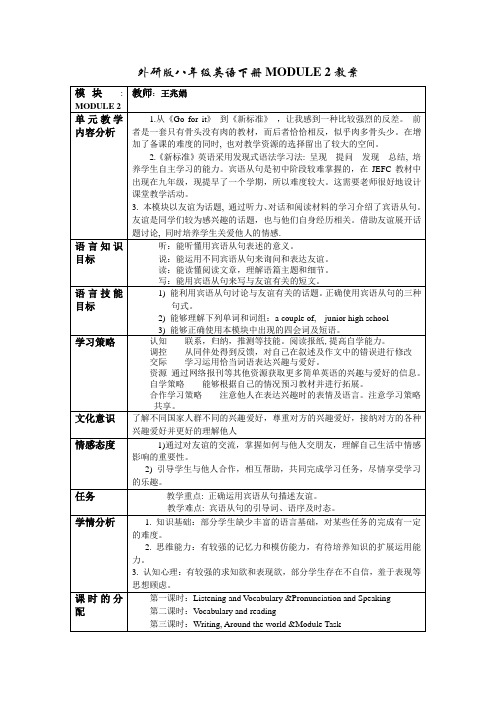
Where are you from?既是为了活跃课堂气氛,激发学生的学习兴趣, 又是为 了能很快进入主题 Can you tell me where you’re from?
Step 2 Pair work
1. Where are you from?
生自由向老师提问, 老师重复学生的问题, 很自然地引出新知识---疑 问句的宾语从句。 eg.
S1: Miss Ni, do you still like teaching English?
T: S1 wants to know if I still like teaching English. I’m glad to tell you that I
3. Make a telephone call. Mr. Wang telephoned Father. But Father wasn’t in. You answered the
telephone. (用两只电话机让学生在课堂上表演)
4. U3 Activity 5, 2, 3, 4 设计意图 在常规听力练习中进一步提高学生听的能力,在尽可能真实的 情景中巩固打电话用语。
最后拓展到课外。
Step 4 Talk about Liu Xiang eg. S1 : Liu Xiang was born in Shanghai.
S2: What does S1 say? S3: He/she says (that) Liu Xiang was born in Shanghai.
教师准备好一个抽奖箱,箱子里事先放入一些写有活跃气氛的简单句 的纸条。两个学生一起上去,一个在箱子里抽取一张纸条,大声读。另一个 学生重复。让学生们在笑声中复习知识。
英语八下册外研版module2:教案【unit3表格式教案】
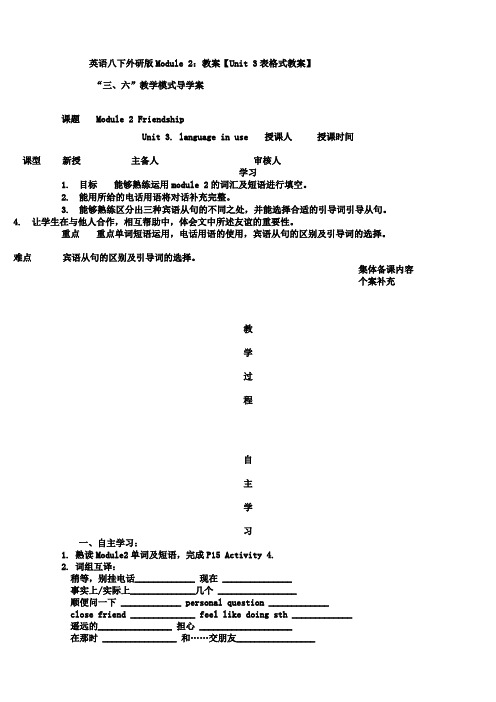
英语八下外研版Module 2:教案【Unit 3表格式教案】“三、六”教学模式导学案课题Module 2 FriendshipUnit 3. language in use授课人授课时间课型新授主备人审核人学习1.目标能够熟练运用module 2的词汇及短语进行填空。
2.能用所给的电话用语将对话补充完整。
3.能够熟练区分出三种宾语从句的不同之处,并能选择合适的引导词引导从句。
4. 让学生在与他人合作,相互帮助中,体会文中所述友谊的重要性。
重点重点单词短语运用,电话用语的使用,宾语从句的区别及引导词的选择。
难点宾语从句的区别及引导词的选择。
集体备课内容个案补充教学过程自主学习一、自主学习:1. 熟读Module2单词及短语,完成P15 Activity 4.2. 词组互译:稍等,别挂电话_____________ 现在 _______________事实上/实际上______________几个 _________________顺便问一下 _____________ personal question _____________close friend ______________ feel like doing sth _____________遥远的________________ 担心 ____________________在那时 ________________ 和……交朋友_________________一天天地 _______________ 害怕做…… __________________3. 组内翻译Activity 5 方框内打电话用语的句子,然后完成对话。
二、导学达标:1.看下面的宾语从句,小组内分析三种宾语从句异同。
(1). I know that foreigners find China very different from their own countries.(2). I don’t know who will come.(3). I’ve heard that you play in the school orchestra.(4). I asked your secretary whether she could come or not.(5). Do you know if Sally Maxwell is here yet?(6). Can you tell me where you’ve from?核对答案,讲解必要知识点。
外研版八年级下册英语教案设计Module2 Unit2
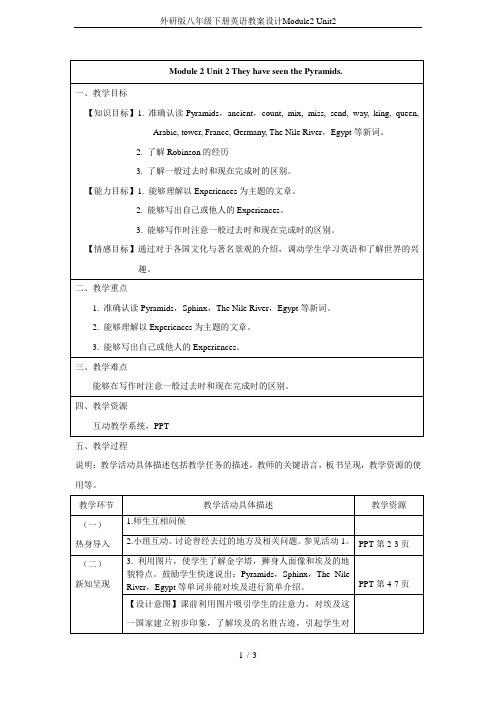
4.本课重点小结。
PPT第15页
5. 课堂小测验。检验当堂课所学知识。
PPT第16-18页
【设计意图】在课文学习后进行相关写作练习,以便学生结合所学习内容,能加以正确的运用本课语言结构,充分掌握如何描述自己或他人的经历。
(五)
布置作业
复述课文。并以A special trip为主题写一篇文章。
The second part: what to do and how to do.
The third part: your opinionsor feelings.
说明:教学活动具体描述包括教学任务的描述,教师的关键语言,板书呈现,教学资源的使用等。
教学环节
教学活动具体描述
教学资源
(一)
热身导入
1.师生互相问候
2.小组互动。讨论曾经去过的地方及相关问题。参见活动1。
PPT第2-3页
(二)
新知呈现
3.利用图片,使学生了解金字塔,狮身人面像和埃及的地貌特点。鼓励学生快速说出:Pyramids,Sphinx,The Nile River,Egypt等单词并能对埃及进行简单介绍。
3.利用小组活动的形式在课文中找到相关重点和难点词汇,1)have/has been to 2)have/has gone to 3)be different from 4)find it+adj.+to do 5)So faretc.进行重点记忆。
4.通过阅读理解填词的形式,巩固文章内容及新词汇。参见活动3。
2.了解Robinson的经历
3.了解一般过去时和现在完成时的区别。
【能力目标】1.能够理解以Experiences为主题的文章。
新外研版初中英语八年级下册Module2教案
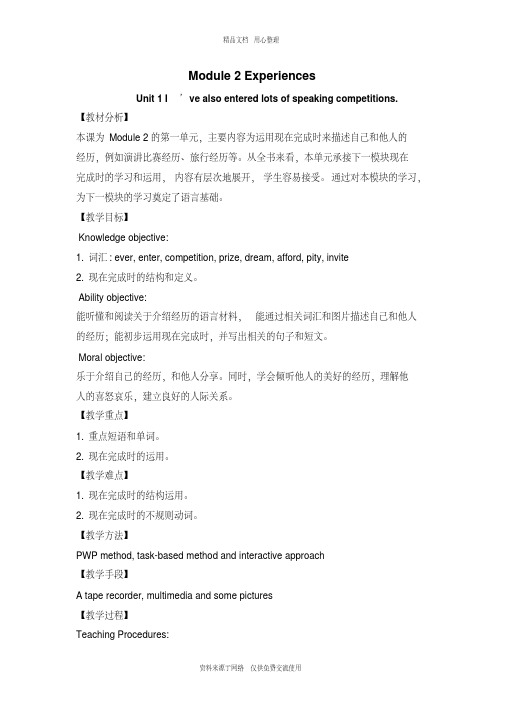
Module 2 ExperiencesUnit 1 I’ve also entered lots of speaking competitions.【教材分析】本课为Module 2的第一单元,主要内容为运用现在完成时来描述自己和他人的经历,例如演讲比赛经历、旅行经历等。
从全书来看,本单元承接下一模块现在完成时的学习和运用,内容有层次地展开,学生容易接受。
通过对本模块的学习,为下一模块的学习奠定了语言基础。
【教学目标】Knowledge objective:1. 词汇: ever, enter, competition, prize, dream, afford, pity, invite2. 现在完成时的结构和定义。
Ability objective:能听懂和阅读关于介绍经历的语言材料,能通过相关词汇和图片描述自己和他人的经历;能初步运用现在完成时,并写出相关的句子和短文。
Moral objective:乐于介绍自己的经历,和他人分享。
同时,学会倾听他人的美好的经历,理解他人的喜怒哀乐,建立良好的人际关系。
【教学重点】1. 重点短语和单词。
2. 现在完成时的运用。
【教学难点】1. 现在完成时的结构运用。
2. 现在完成时的不规则动词。
【教学方法】PWP method, task-based method and interactive approach【教学手段】A tape recorder, multimedia and some pictures【教学过程】Teaching Procedures:Step 1 Lead in1. Ss watch the video and answer “What’s this video about?”2. Ss look at the pictures and answer the questions.Step 2 Consolidate new wordsLook and say. The teacher shows the pictures of new words and let the students to say as quickly as possible.Step 3 Listen and number the words as you hear them1.Look at the words first.2.Then listen to the tape and number the words.Step 4 Listen again and choose the correct answer1.Look at the three sentences carefully.2.Listen to the tape again and choose the correct answer.Step 5 ReadingListen and read, then answer the two questions:1. What is Lingling entering?2. Who is going to enter the writing competition?Step 6 Work in pairs.1. Work in groups. Make a competition to find who can find out the most sentenceswhich are the present perfect tense.2. Read Part 3 and check what Linging and Tony have or have not done.3. Work in pairs. Ask an answer questions about what Linging and Tony have orhave not done.Step 7 Everyday EnglishMaster the main sentences in the passage.Step 8 Language pointsSs should master the main points from the passage in Part 3. If possible, let the students to say at first.1. I am entering a competition.我正参加一个比赛。
外研版初中八年级英语下册 Module 2 集体备课教案含教学反思

自主学习方案1. 学生自学新词汇(见教材P112)完成学案中相关练习所对应的重点单词。
2. 学生自学教材(P10),找出课文中重点词组和句子。
完成学案中相关练习所对应的重点词组和重点句子。
课堂导学方案Step 1 情景导入教师询问学生是否参加过演讲比赛,是什么类型的演讲比赛,曾做过怎样的准备,得过什么样的名次等冋题。
环节说明:教师根据自己提出的问题,邀请学生来回答。
教师的问题既引起学生学习的兴趣,又激发了学生学习的积极性。
Step2完成教材1、2任务1. 要求学生朗读任务1方框里的单词,为下面的教学任务做准备。
2. 听录音,把单词标上序号,完成任务1。
3. 再听一次,从下面句子中选择正确的答案,完成任务2。
4. 小结训练。
根据所给汉语提示完成句子。
(1)I have ever(曾经)visited the USA.(2)Have you entered(参加)lots of speaking competitions (比赛)?(3)I am tired(疲劳的)today.环节说明:任务1〜2和小结训练,让学生对本节词汇掌握得更牢固。
Step 3完成教材3的对话理解1. 大声朗读3,找出重难点句子。
2. 教师详细讲解,学生熟记语言重点。
3. 播放录音,学生跟读。
4. 小结训练。
根据汉语提示完成句子。
(1)他们参加过比赛吗?Have they ever entered a competition.(2)太遗憾了。
That’s a pity.(3)那听起来太精彩了。
That sounds wonderful ,环节说明:通过教师讲解,学生熟记以及通过听力训练来提高学生阅读理解能力。
小结训练让学生熟悉教材。
Step4 问题探究1. ever adv.意为“曾经;从来”,它常与形容词或副词的最高级连用以加强语气,该词常用于现在完成时中。
如:Have you ever been to England?你曾经去过英格兰吗?—No,never.从来没有。
外研版英语八年级下册(教学设计)Module 2 Unit 2

Module 2 ExperiencesUnit 2 They have seen the Pyramids.主要谈论与旅游相关的经历,分设三个课时进行学习。
本节课是这个模块中的第二课时,是一节读写课型的新授课。
作为模块的第课,它为第二、三单元不仅提供了话题和语境,同时也为学生们后来的学习扫清语言和文化的障碍。
本单元的阅读内容讲述的是美国小孩迈克.罗宾逊和妹妹随父亲在不同国家生活,所获得的生活见闻和收获的事情。
内容与学生们的实际生活息息相关,激发了学生的学习兴趣,语言实践活动也比较好开展。
本单元的重点是在语境中理解现在完成时的含义,并熟练掌握用现在完成时表达询问他人经历和向他人介绍自己的经历。
难点是在特定语境下理解现在完成时的含义并能正确运用这一时态,使语法知识的学习融入生活实践,培养用语言做事的能力。
Key vocabulary —move, send, Germany, France, tower, ancient, king, queen,Arabic, way, mix, miss, countKey structures —count down, so far, in many ways,have been to, find it hard to do sth.【能力目标】To get information about the Pyramids.To master the present perfect tense.【情感目标】在教学过程中,学生们通过实践、参与有意义的各种形式的活动,体验与他人合作,共同完成学习任务的乐趣。
在本课中,通过对于罗宾逊家庭的工作和生活经历的了解,让学生了解西方人热衷旅行,追求自由的个性;了解各地不同的地理环境和风景名胜。
1. To learn some expressions in the passage.2. To learn the present perfect tense.【教学难点】1. To get information from the article.2. To write a composition by using the present perfect tense.PPT课件、录音机、课堂练习Answer the questions according to the pictures, and let Ss know about experiences.Step 2 Consolidate new wordsLook and say. The teacher shows the pictures of new words and let the students to say as quickly as possible.Step 3 Pre-reading1. Ss ask and answer the questions in pairs.1).Which interesting places in China have you visited?2).Have you ever seen the Great Wall?3).Have you ever visited another country?2. Look and say what you can see in the picture.Step 4 ListeningLook at the two questions, then listen to the tape and answer the questions.Step 5 ReadingRead the passage and answer the six questions.1. How long have the Robinsons been in Egypt?2. Why do they live in Cairo?3. What have they seen and done in Egypt?4. What do Mike and Clare find difficult about Arabic?5. Who do they miss in the US?6. Are they looking forward to going home?Answers: 1. Two years.2. Because Peter’s company sent him to work and his family went with him.3. They have seen the Pyramids, travelled on a boat on the Nile River, and visited the。
外研版英语八年级下册Module2Unit2教案
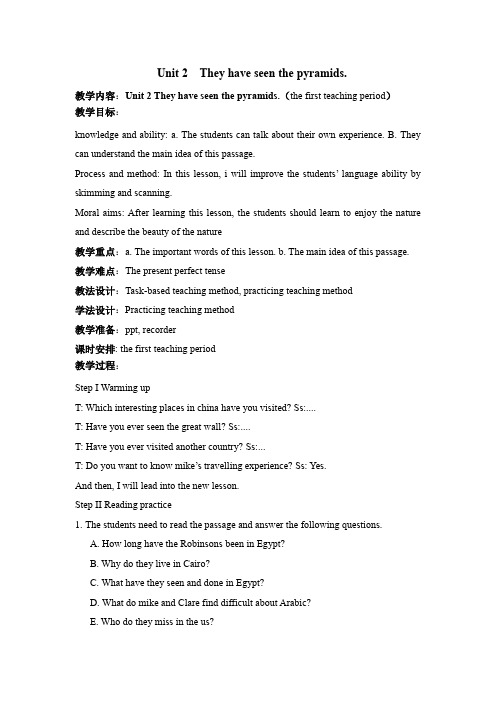
Unit 2 They have seen the pyramids.教学内容:Unit 2 They have seen the pyramids.(the first teaching period)教学目标:knowledge and ability: a. The students can talk about their own experience. B. They can understand the main idea of this passage.Process and method: In this lesson, i will improve the students’ language ability by skimming and scanning.Moral aims: After learning this lesson, the students should learn to enjoy the nature and describe the beauty of the nature教学重点:a. The important words of this lesson. b. The main idea of this passage.教学难点:The present perfect tense教法设计:Task-based teaching method, practicing teaching method学法设计:Practicing teaching method教学准备:ppt, recorder课时安排: the first teaching period教学过程:Step I Warming upT: Which interesting places in china have you visited? Ss:....T: Have you ever seen the great wall? Ss:....T: Have you ever visited another country? Ss:...T: Do you want to know mike’s travelling experience? Ss: Yes.And then, I will lead into the new lesson.Step II Reading practice1.The students need to read the passage and answer the following questions.A. How long have the Robinsons been in Egypt?B. Why do they live in Cairo?C. What have they seen and done in Egypt?D. What do mike and Clare find difficult about Arabic?E. Who do they miss in the us?F. Are they looking forward to going home?2.The teacher checks the answers and the students read this part together for three minutes.3.The students need to close their books and then answer the questions.Step III Reading1.The students need to read the passage together.2. The teacher teaches the words which the students can’t read.3. The students read the passage by themselves for five minutes.4. The students read the passage together again.Step IV Exercises 用方框中所给词的适当形式填空。
外研社英语八年级下同步辅导与练习Module教案修订稿
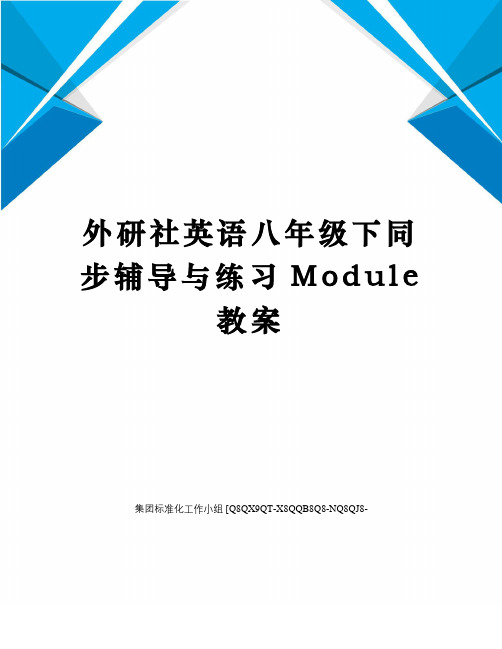
外研社英语八年级下同步辅导与练习M o d u l e教案集团标准化工作小组 [Q8QX9QT-X8QQB8Q8-NQ8QJ8-Module 2 Spring Festival重点、难点:1. 语言知识详解2. 词义拓展具体内容:1. What’s happening 发生了什么事(1)happen to do 碰巧做……,偶然发生When I went to see him, he happened to be out.(2)happen to sb 某人发生某事If anything happens to the car, let me know.2. Are you getting ready for the Spring Festival(1)get ready for…为……准备好I’m getting ready for the theatre. 我准备到戏院去。
The army is ready for action.军队准备行动。
(2)be always ready to help 乐于帮助The teacher is always ready to help the children with their work.He is always ready to help his classmates with their lessons.(3)get sth ready 把……准备好Class begins, so please get your books ready.I’m getting ready for the new term, and I have to get my school things ready.3. It means good luck.(1)What does sth. mean= What do you mean by sth= What’s the meaning of something(2)good luck 好运气——bad lucklucky adj. Luckily adv.Luckily, they found the boy.4. We usually decorate the doors and windows red.(1)decorate …with …People decorate the streets with red flags.The family decorate the Christmas tree with glass balls and lights.(2)with 的用法I’d like a mooncake with nuts. (具有)She is a girl with blond hair and blue eyes. (长有)We spent a good time with my students. (和……一起)In summer I usually sleep with the windows open. (表示条件、环境)He is quite angry with his mother. (对…)5. Are the boys making lanterns我们学过的带有make 的短语:make a mistake 犯错误make friends with …和某人交朋友make sure 确保make a plan 制定个计划【典型例题】Find the mistake in the sentences and then correct it.1. Mary is putting on a new T-shirt.A B C答案:B,改成wearing解析:put on 强调穿的动作,wear强调穿的状态。
外研版八下M2U2教学案
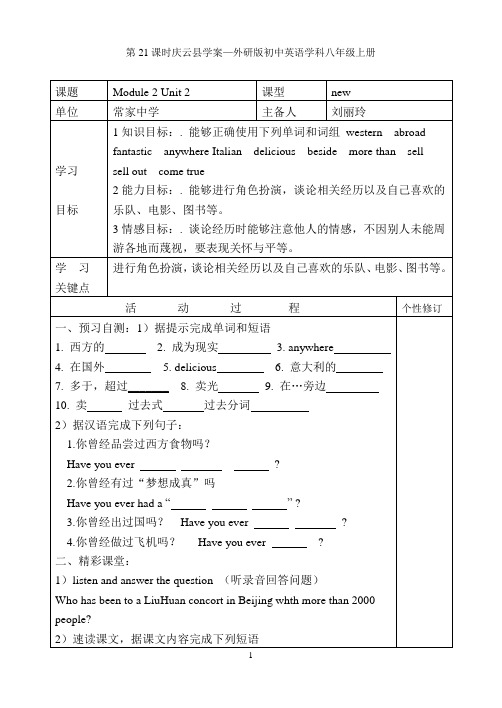
5.write________ _________ 6.fly_________ _________
7.give__________ _________ 8.meet________ _________
A.somewhere B. anywhere C. everywhere D. any places
3. We are all in the classroomJim.
A.beside B. besides C. beside to D. next to
二、用所给单词的适当形式填空。
1.His concert is so fantasitic and the tickets have been(sell) out.
4.在国外5. delicious6.意大利的
7.多于,超过_______8.卖光9.在…旁边
10.卖过去式过去分词
2)据汉语完成下列句子:
1.你曾经品尝过西方食物吗?
Have you ever?
2.你曾经有过“梦想成真”吗
Have you ever had a “” ?
3.你曾经出过国吗?Have you ever?
5. We(从没试过)Beijing roast duck.
6.你为什么不听一听收音机呢?you listen to the radio ?
7.他想成为一名歌手的梦想终于成真了。
His dream of becoming a singer has
8.他们在北京开过演唱会。
They haveinBeijing.
(2) Tom is a student. Jack is a student,too.
英语外研版八下Module2 Unit 2教案

Module 2 EXPERIENCESUnit 2 They have seen the Pyramids.教学目标【知识与技能】1. 能读懂有关旅行地点和旅行活动的描述并提取相关信息。
2. 能理解和复述课文语篇和完成语篇理解到运用的提升。
【情感、态度与价值观】1. 了解西方人热衷旅行,追求自由的个性。
2. 了解各地不同的地理环境和风景名胜。
教学重难点【教学重点】在语境中理解现在完成时的含义,并熟练掌握用现在完成时表达询问他人经历和向他人介绍自己的经历。
【教学难点】在特定语境下理解现在完成时的含义并能正确运用这一时态,使语法知识的学习融入生活实践。
教学准备图片、视频、多媒体等教学过程Step 1 Warming upLook at the picture and answer.Step 2. Lead inAccording to the following pictures, ask and answer questions about the pictures in pairs.A: Have you ever been to…?B: Yes, I have./ No, I haven’t.Step 3. PairworkWork in pairs. Ask and answer the questions.1. Which interesting places in China have you visited?2. Have you ever seen the Great Wall?3. Have you ever visited another country?Step 4. PresentationShow pictures about Egypt and the new words.Step 5 Reading1. Watch and answer the questions:1 Where are the Robinsons now?2)What languages have Mike and Clare learnt to speak?2. Read the passage.1)fifteen-year-old2)one of3)have been to4)find it5)are moving6)count down3. Answer the questions:1) How long have the Robinsons been in Egypt?2) Why do they live in Cairo?3) What have they seen and done in Egypt?4) What do Mike and Clare find difficult about Arabic?5) Who do they miss in the US?6) Are they looking forward to going home?4. Complete the passage with the correct form of the words in the box.Step 6 Exercise1. They get there by plane.(就划线部分提问)_____ ___ they get there?2. They are not in the same class.(改为同义句)They are in ________ _______.3. Jim has already written an email.(改为否定句)Jim ______ _______ an email ___.4. have, had, you, seafood, ever (连词成句)___________________________?Step 7 Writing1. Work in pairs. Think of a special trip. Write notes and explain:* where you went* when you went there* why it was special* how you feel when…2. Discussion and writingAn Unforgettable Travel Experience1) When…?Where…? Who…?2) What have you seen or done? How…? Why…?3. Write sentences to describe what you have seen or done. Use the passage in Activity 2 to help you.课堂作业Write a passage about your travel experience. If you can , share your special life experiences with your friends in English .教学反思。
外语教研版初中英语八年级下册Module 2 Unit 2教学详案

Module 2 ExperiencesUnit 2 They have seen the Pyramids. 设计说明首先通过一些图片让学生复习现在完成时态的各种句式,然后通过问题Have you ever visited the Pyramids?导入到本单元课文,在学习课文之前,先通过图片和反复朗读学会本单元生词的意思和读音。
对课文的处理,分别通过速读和精读并配以相应的练习让学生达到对课文内容的理解,并掌握一定的阅读技巧;最后让学生根据对课文的学习能仿照写出关于自己旅行经历的文章。
教学目标通过本单元的教学,让学生达成以下目标1.知识目标:掌握单词:move, send, Germany, France, tower, ancient, king, queen, way, mix, miss, count掌握短语:be different from, ask sb. to do sth., count down, so far, in many ways, have been to, find it hard to do sth.2.能力目标:(1)能读懂并理解关于经历的短文的细节(2)能用现在完成时描述自己的经历,并形成一篇文章3.情感目标:更多地了解他人的经历,更好地相互理解重点难点重点:本单元所学生词和用现在完成时态描述经历难点:用现在完成时态描述经历教学准备PPT课件,相关图片授课时数2课时教学过程Step 1 RevisionShow some pictures. Then ask students to ask and answer in present perfect tense.the football competition the volleyball competitionthe bike competition the writing competitionS1: Have you ever...?S2: Yes, I have./ No, I haven’t. I have...S3:...S4:...Step 2 Pre-reading1. Let students ask and answer the questions in pairs.1) Which interesting places in China have you visited?2) Have you ever seen the Great Wall?3) Have you ever visited another country?2. Let students look and say what they can see in the picture.3.Ask students something about the Pyramids.e.g.:Have you ever visited the Pyramids?Have you ever read some books about the Pyramids?What have you known about the Pyramids?Step 3 Learning about new words1.Let students know the meanings of the following new words with the help of pictures and so on.move, send, Germany, France, tower, ancient, king, queen, way, mix, miss, count2.Lead students to read the new words three times or more.3.Let students circle the new words in the passage of Activity 2 and think about their use.Step 4 Fast reading1.Ask students to read the passage quickly and then match the main idea with each paragraph.2.Check the answers.Answers: Para.1—E Para.2—C Para.3—D Para.4—A Para.5—B Step 5 Careful reading1.Let students read Paras.1-3 and answer the following questions.1) How long have the Robinsons been in Egypt?2) Why do they live in Cairo?3) What have they seen and done in Egypt?2.Check students’ answers and ask them to say how they know the answers. Answers:1)They have been in Egypt for two years.2)Because their father works there.3)They have visited the Pyramids, travelled on a boat on the Nile River andvisited the palaces and towers of ancient kings and queens.3.Let students read Paras.4-5 and answer the following questions.4) What do Mike and Clare find difficult about Arabic?5) Who do they miss in the US?6)Are they looking forward to going home?4.Check students’ answers and ask them to say how they know the answers. Answers:4)It is hard to spell and pronounce the words.5)Their friends.6)Yes, they are.Step 6 PracticeAsk students to complete Activity 3 and check their answers.Answers:example , ancient, kings, queens, mix, countingStep 7 Language points1. … and it has sent Peter to work in Germany, France and China before.……公司已经派彼得去德国,法国和中国工作过。
2011-2012英语八下外研版Module2教案【Unit2教案】
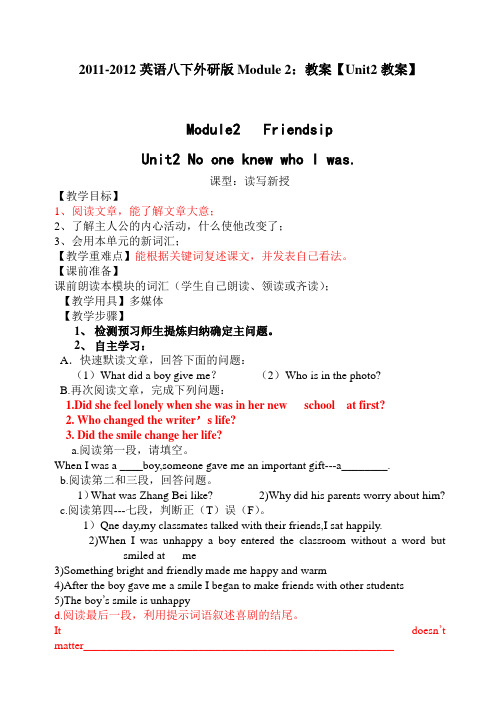
2011-2012英语八下外研版Module 2:教案【Unit2教案】Module2 FriendsipUnit2 No one knew who I was.课型:读写新授【教学目标】1、阅读文章,能了解文章大意;2、了解主人公的内心活动,什么使他改变了;3、会用本单元的新词汇;【教学重难点】能根据关键词复述课文,并发表自己看法。
【课前准备】课前朗读本模块的词汇(学生自己朗读、领读或齐读);【教学用具】多媒体【教学步骤】1、检测预习师生提炼归纳确定主问题。
2、自主学习:A.快速默读文章,回答下面的问题:(1)What did a boy give me?(2)Who is in the photo?B.再次阅读文章,完成下列问题:1.Did she feel lonely when she was in her new school at first?2. Who changed the writer’s life?3. Did the smile change her life?a.阅读第一段,请填空。
When I was a ____boy,someone gave me an important gift---a________.b.阅读第二和三段,回答问题。
1)What was Zhang Bei like? 2)Why did his parents worry about him?c.阅读第四---七段,判断正(T)误(F)。
1)Qne day,my classmates talked with their friends,I sat happily.2)When I was unhappy a boy entered the classroom without a word butsmiled at me3)Something bright and friendly made me happy and warm4)After the boy gave me a smile I began to make friends with other students5)The boy’s smile is unhappyd.阅读最后一段,利用提示词语叙述喜剧的结尾。
外研版初中英语八年级下册教案:Module 2 Friendship
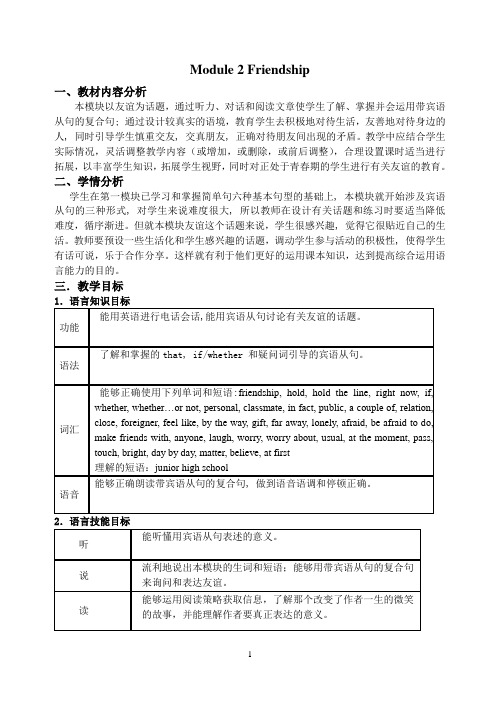
Module 2 Friendship一、教材内容分析本模块以友谊为话题,通过听力、对话和阅读文章使学生了解、掌握并会运用带宾语从句的复合句; 通过设计较真实的语境,教育学生去积极地对待生活,友善地对待身边的人, 同时引导学生慎重交友, 交真朋友, 正确对待朋友间出现的矛盾。
教学中应结合学生实际情况,灵活调整教学内容(或增加,或删除,或前后调整),合理设置课时适当进行拓展,以丰富学生知识,拓展学生视野,同时对正处于青春期的学生进行有关友谊的教育。
二、学情分析学生在第一模块已学习和掌握简单句六种基本句型的基础上, 本模块就开始涉及宾语从句的三种形式, 对学生来说难度很大, 所以教师在设计有关话题和练习时要适当降低难度,循序渐进。
但就本模块友谊这个话题来说,学生很感兴趣, 觉得它很贴近自己的生活。
教师要预设一些生活化和学生感兴趣的话题,调动学生参与活动的积极性, 使得学生有话可说,乐于合作分享。
这样就有利于他们更好的运用课本知识,达到提高综合运用语言能力的目的。
三.教学目标2.语言技能目标3.文化意识目标生活在科学技术和信息技术日益发展的社会中的人们可以通过书信和网络等方式进行交友,人们可以在交友的过程中学习和享受生活。
了解中西方打电话文化的差异。
4.情感态度目标引导学生积极地面对生活,真诚地对待别人,跟朋友建立起真正的友谊。
5.学习策略目标自主学习能够结合个人的情况预习教材和拓展。
合作学习能够与同学交流学习心得会,共享策略。
学生利用学会的语言知识去真实的沟通和交际,从而使语言知识得以内化,真正做到学以致用。
四、重点难点1.教学重点熟练掌握本模块中出现的词汇;掌握宾语从句并了解连接主句和从句的连词的语法功能;学会用宾语从句说一些句子;学会用英语打电话;教会学生掌握阅读技巧,培养学生阅读理解能力。
2. 教学难点掌握英语电话用语;掌握宾语从句;培养学生能够正确运用阅读策略获取信息。
五、突破途径①.以话题为核心,整合教材,努力为学生创设真实和接近真实的语境,使学生在学中用,在用中巩固;②.本模块的宾语从句则通过感知-归纳-巩固的方法加以突破。
- 1、下载文档前请自行甄别文档内容的完整性,平台不提供额外的编辑、内容补充、找答案等附加服务。
- 2、"仅部分预览"的文档,不可在线预览部分如存在完整性等问题,可反馈申请退款(可完整预览的文档不适用该条件!)。
- 3、如文档侵犯您的权益,请联系客服反馈,我们会尽快为您处理(人工客服工作时间:9:00-18:30)。
Module 2 Spring Festival重点、难点:1. 语言知识详解2. 词义拓展具体内容:1. What’s happening? 发生了什么事?(1)happen to do 碰巧做……,偶然发生When I went to see him, he happened to be out.(2)happen to sb 某人发生某事If anything happens to the car, let me know.2. Are you getting ready for the Spring Festival?(1)get ready for…为……准备好I’m getting ready for the theatre. 我准备到戏院去。
The army is ready for action.军队准备行动。
(2)be always ready to help 乐于帮助The teacher is always ready to help the children with their work.He is always ready to help his classmates with their lessons.(3)get sth ready 把……准备好Class begins, so please get your books ready.I’m getting ready for the new term, and I have to get my school things ready.3. It means good luck.(1)What does sth. mean?= What do you mean by sth?= Wh at’s the meaning of something?(2)good luck 好运气——bad lucklucky adj. Luckily adv.Luckily, they found the boy.4. We usually decorate the doors and windows red.(1)decorate …with …People decorate the streets with red flags.The family decorate the Christmas tree with glass balls and lights.(2)with 的用法I’d like a mooncake with nuts. (具有)She is a girl with blond hair and blue eyes. (长有)We spent a good time with my students. (和……一起)In summer I usually sleep with the windows open. (表示条件、环境)He is quite angry with his mother. (对…)5. Are the boys making lanterns?我们学过的带有make 的短语:make a mistake 犯错误make friends with …和某人交朋友make sure 确保make a plan 制定个计划【典型例题】Find the mistake in the sentences and then correct it.1. Mary is putting on a new T-shirt.A B C答案:B,改成wearing解析:put on 强调穿的动作,wear强调穿的状态。
2. How often does Tony always buy newspaper?A B C答案:B,去掉解析:how often 问的是多长时间一次,是个频率疑问词,always 是频率副词,重复了。
3. That is an European wolf. It likes meat.A B C答案:A,改为a解析:European 虽然是原音字母E开头的单词,但是发的是辅音/j /。
4. He often has the lunch at 12:00 at school.A B C答案:C,去掉the解析:have breakfast, have lunch, have supper, 一日三餐前均不加冠词。
【模拟试题】(答题时间:60分钟)一. Choose the best answer1. Listen! What _________?A. happenB. happeningC. is happeningD. happens2. —Are they decorating the windows with the paper cuts?—_________.A. No, they areB. No, they aren’tC. Yes, they aren’tD. Yes, it is.3. —Do you like swimming?—____________.A. Yes, I don’tB. No, I don’tC. Yes, you areD. I like4. —________ do you like the film?—Very much.A. WhatB. HowC. WhichD. Why5. We can get presents _______ the New Year’s Eve.A. atB. onC. toD. in6. —Who is sweeping the floor?—_________.A. My uncleB. My uncle’sC. A houseD. Me7. —Where is your mum?—______.A. She does washing.B. She is cleaning the house.C. She goes out.D. Yes, she is.8. —Would you like ______ the new website?—Yes, I’d like to.A. to visitB. visitC. visitsD. visiting9. Quite a lot of children get together in the park ______ June 1st to celebrate Children’s Day.A. onB. fromC. atD. by10. I don’t understand the story thought there are _______ new words in it.A. a fewB. fewC. manyD. several二. Fill in the blanks.1. —How many English l__________ do you have every week?—Four.2. There are lots of a__________ in the forest.3. He can’t p__________ computer games.4. The e___________ is big with a long nose.5. At f our o’clock American people drink afternoon t_________ or coffee.6. Tony u_________ walks to work but today he goes by bus.7. At Spring Festival we paint the doors and w__________ red. It can bring good luck.8. We have many kinds of t____________ food at the Lantern Festival, such as yuanxiao.9. He doesn’t like __________(be)late.10. Would you go ______________(shop)with me?11. Let’s ___________(start)our homework.12. What color ____________(be)your trousers?13. I want ____________(buy)a dictionary.14. He wants to __________(write)a letter.15. We can _________(make)travel plans.三. Fill in the blanks with proper prep or adv.1. We are going swimming ________ the moment.2. We put on new clothes ________ the Spring Festival.3. The New Year finishes __________ the Lantern Festival.4. Red can bring us good luck all the year ___________.5. First switch _______ the computer.6. We buy lots of meat __________ the tiger.7. Tony can write his homework _______ the computer.8. The children like to decorate their classroom ______ paper cuts.9. ___________ Friday morning we have a PE lesson.10. My father is _______ work now.11. Please get ready _______ the next lesson.12. We watch TV and _________ midnight there are usually fireworks.13. They go shopping ________ presents and they got lots of food ready.14. He is a fat man _________ a long white beard.15. Children are usually more interested _________ Father Christmas.四. Reading(A)Once upon a time, a rich man and a poor tailor happened to live in the same house. The rich man lived upstairs and the poor tailor lived downstairs.The tailor liked to sing while he worked. He sang one song after another. But the rich man liked to sleep and the singing bothered him.One day the rich man said, “Tailor, I will give you a bag full of money every day if you will stop singing.”“Fine,” said the poor tailor. And so the tailor stopped singing and he became richer and richer. But the more money he got from the rich man, the unhappier he became, because he wanted very much to sing again.Finally he brought all his money back to the rich man. “Here,” he said, “Take all your money. I cannot be happy if I can’t sing.”And so he gave the money back to the rich man and went away singing. He sang and sang and he was happy again.T or F?1. The rich man and the poor tailor lived in the same room.2. The tailor liked singing when he was working.3. The rich man gave the poor tailor a lot of money because he liked to hear the tailor singing.4. The poor tailor took the money and went away.5. The poor tailor returned to the rich man all the money he had got from the rich man because he became unhappy when he could not sing.(B)Tom saw an advertisement in a newspaper for a beautiful modern bicycle. It cost 55 pounds, so he went to the shop and asked to see one of the wonderful bicycles.The owner of the shop was very happy to show one to Tom. Tom examined it carefully, turned to the owner of the shop and said, “There isn’t a lamp on this bicycle, but there was one on th e bicycle in your advertisement.”“Yes, sir.” Answered the man. “But the lamp isn’t included in the price of the bicycle.”“Not included in the price of the bicycle?” Tom said angrily. “But that’s not honest. If the lamp is in the advertisement, it s hould be included in the price.”“Well, sir,” answered the shop owner coldly. “There is also a girl on the bicycle in the advertisement. But we can not give you a girl with the bicycle, either.”1. In the advertisement, there was a and a on the bicycle.A. lamp, manB. picture, lampC. lamp, girlD. newspaper, shop owner2. After he read the advertisement, Tom decided to .A. see and buy the lampB. examine the bicycleC. see and buy the bikeD. ask the shop owner3. Tom after he looked at the bike carefully.A. returned the bike to the shop ownerB. didn’t find a lamp on the bicycleC. showed the bike to the shop ownerD. bought the bicycle at once4. Tom thought it was for the shop owner to sell the bike without a lamp while there was one in the advertisement .A. necessaryB. honestC. rightD. wrong5. The text gives us a lesson that .A. we must read a newspaper carefullyB. bicycles must be examined carefully before they are boughtC. we can’t completely believe an advertisement sometimesD. the price of something is often changed五. Gap-filling.Two good friends, Peter and Linda, are making arrangements over the telephone to meet at the weekend.Peter: Hello, this is Peter Chang 1 .Linda: Hello Peter, it’s Linda here. I wanted to thank you for2 me to your party yesterday. I really 3 myself.Peter: I’m glad you 4 a good time, Linda. I 5 there is a Jackie Chan film on at the cinema. Would you 6 to see the film with me on Sunday night?Linda: I’d love to, Peter.Peter: The film 7 at 7:45.Shall I 8 you at 7:30 outside the cinema?Linda: 7:30 9 fine. 10 you on Sunday, Peter.Peter: See you then, Linda. Bye.Linda: Bye.(B)The great gift a p_____ can give a child is to show him that learning is important and thatthere are rules about it. Even if your child has no h________, you’d better s______ 10to 20 minutes a day reading to him or going o______ the day’s lesson. That shows you are i_____ in your child’s study and that learning goes on at home too.Don’t call it homework time. If you say so, c______ will say “I don’t have any homework today or I did it at s______.” you may call it a study t______. Let your children have the idea that they always have homework——reading, w_____ letters, organizing notes or preparing for tomorrow. Tell them that what they do at home is as i________ for their education as what they do at school.(C)My husband, Tom, is a born-shopper. He loves to look at the things and to t 1 them. He loves to compare prices b 2 the same items and in d 3 stores. He will never think of b 4 anything w 5 looking around in several stores.I, on the o 6 hand, I’m not a shopper. I regard shopping as boring as unpleasant. If I like something and can afford it, I buy instantly. I n 7 take the time to look around for a good sell or for b 8 deal. Bargai ns don’t interest me. Needless to say, Tom and I never go shopping t 9 . Experience will be too painful f 10 both of us. When we come to a shopping, we go our separate ways.【试题答案】一. 1—5 CBBBB 6—10 ABAAB二. 1. lessons 2. animals 3. play 4. elephant 5. tea 6. usually 7. windows8. traditional 9. to be 10. shopping 11. start 12. are 13. to buy14. write 15. make三. 1. at 2. at 3. after 4. round 5. on 6. for 7. on 8. with9. On 10. at 11. for 12. at 13. for 14. with 15. in四. (A)1—5 FTFFT(B)1—5 CCBDC五.(A)1. speaking2. inviting3. enjoyed4. had5. hear6. like7. starts8. meet9. sounds 10. See(B)parent, homework, spend, over, interested, children, school, time, writing,important(C)1. touch2. between3. different4. buying5. without6. other7. never8. better9. together 10. for。
